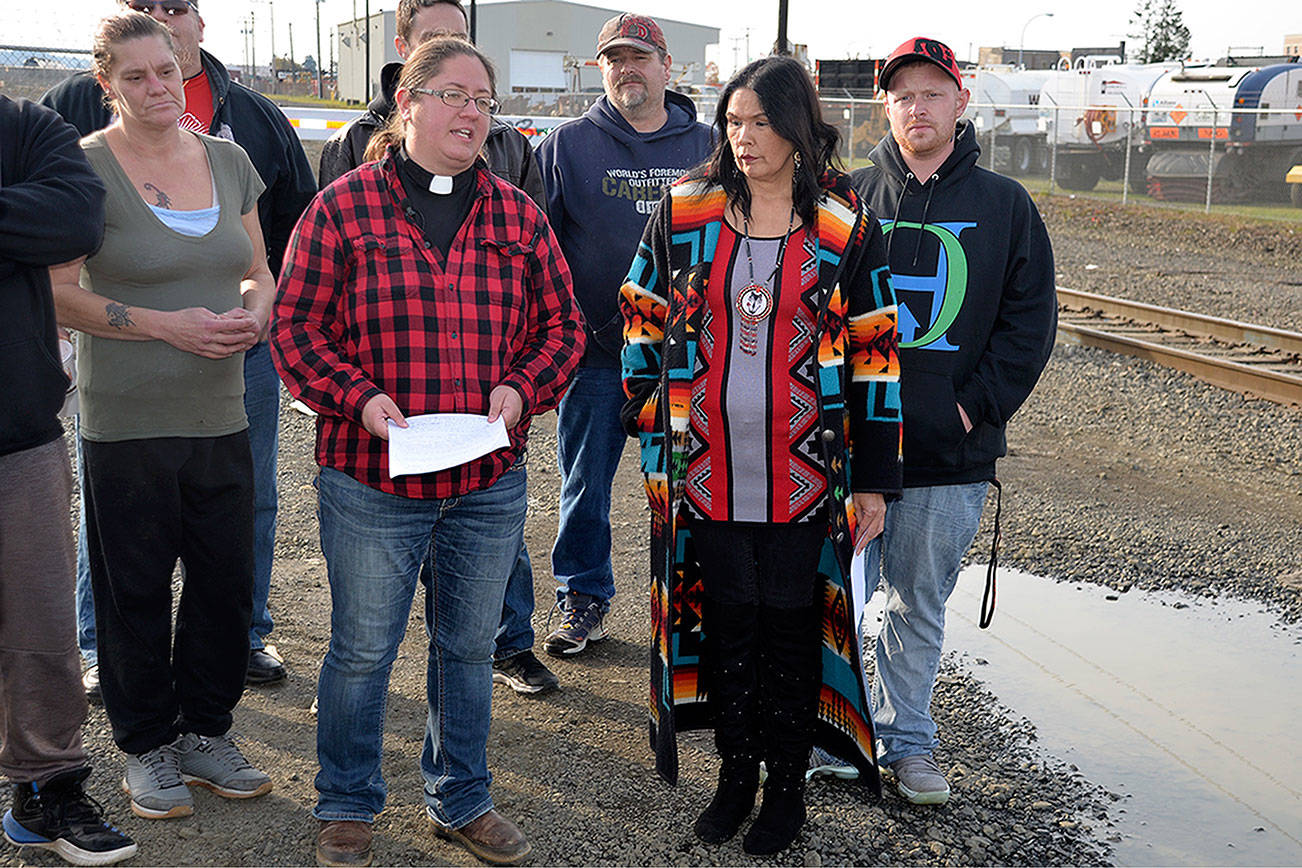The City of Aberdeen, its mayor and a city administrator have been sued in federal court by three people who say the city’s restrictions to the Chehalis riverfront homeless camps violate their First Amendment rights.
The suit was filed in Tacoma’s federal court on Monday, and names the city, Mayor Erik Larson and City Engineer Kris Koski, who drafted rules for who can visit the homeless camp, as the defendants.
The lawsuit was filed by the Rev. Sarah Monroe — who has regularly assisted and provided religious services for homeless people living on the now city-owned property — along with Tim Quigg and Apryl Boling as the plaintiffs. The city recently denied Monroe’s application to access the property to provide services.
Standing at the edge of property for a news conference Tuesday, Monroe said, “The last thing I want to do this winter is bury another person who died of exposure, and I especially don’t want to bury somebody who’s died of exposure knowing that myself and other citizens may have been able to help, had we had access.”
The suit asks for compensatory damages and punitive damages to be determined by the court.
The city owns the land the encampment occupies, and Larson has cited safety concerns for setting up rules for who can be there.
Larson told The Daily World that if the court sides with the plaintiffs, the city would “pursue our other rights to remove individuals from the property, and basically close the property to any access.”
Over the summer, the city purchased the riverfront property for $295,000, and installed a metal gate to prevent vehicles from entering, with the goal of clearing everyone out eventually. The city sent police officers through the camps to get the names of people living there, and gave more than 100 people written authorization papers to temporarily live on the property. Both homeless campers and service providers were told to fill out applications with the city to gain access to the camp.
These applications also have to be filled out by family members of people camped there. If a parent visits their child living on the property without the city’s authorization papers, for example, police could cite them for trespassing. All the applications are reviewed and decided on by the city’s Public Works Director Rick Sangder and Koski.
In a press release, Monroe said she was concerned that the city engineer was determining who gets to provide services to people on the property.
“It is troubling that the City Engineer has been tasked with leading this process, as opposed to someone whose expertise is in health and human services,” she wrote.
Quigg has visited the site often, bringing fire wood and other supplies, and has been an activist in pushing for housing for the homeless. Asked about the suit, Quigg said, “We can do better. That’s all there is to say.”
Boling, who has multiple relatives living at the encampment, still checks in on them despite the city’s restrictions. In the legal documents, Boling wrote that she often brings fire wood to her cousin so he can make a fire for his girlfriend who suffers from epilepsy. Boling says she also holds tribal ceremonies on the property.
In a press release, Monroe wrote, “Homeless people have a constitutionally protected right to freedom of religious expression. I have a constitutionally protected right to my freedom of religious expression, which includes serving the poor and the sick and the hungry. The city’s actions are a clear attempt to isolate, marginalize, and further criminalize people who have already been pushed to the edge of existence in this community. I consider it my duty as an American citizen and my vocation as a priest to stand against this.”
The lawsuit claims that the City of Aberdeen, Larson, and Koski have deprived the plaintiffs of their First Amendment rights to freedom of speech and freedom of religious exercise, as well as other claims. It asks for a temporary restraining order that would prevent the city from arresting them for trespassing when they are visiting or providing services to the homeless camp.
The suit does not address the issue of whether people can live at the homeless camp, and only applies to those who want to access the property to support the campers, whether they be family members, service groups or others.
James Lobsenz, the plantiffs’ attorney, said he has never seen a case like this restricting contact with homeless people, and that he’s confident what the city is doing is illegal.
“It’s a prior restraint, and there’s extremely clear law that prior restraints are considered unconstitutional,” said Lobsenz. “I think we have an extremely strong argument, It’s so settled you can’t do this, that I would be very surprised if we didn’t win.”
If the judge sides with the three plaintiffs, Lobsenz said it could lead to others being able to gain access to the property to provide services to the homeless population.
Larson wrote in a press release that the city will “aggressively” defend against the lawsuit, and later said he thinks it’s unlikely the court will side with Monroe, Quigg and Boling.
“I think it’s very unlikely the federal court will rule that the city doesn’t have the right to restrict access to the property,” said Larson. “It would be a significant risk to public health and safety to not be able to restrict who can access the property.”
Patrice Kent, the city’s attorney, declined to comment on the lawsuit.
At Monroe’s press conference at the main gate to the riverfront property Tuesday afternoon, about 20 former and currently homeless people, and local homeless service providers came to support Monroe and Boling.



